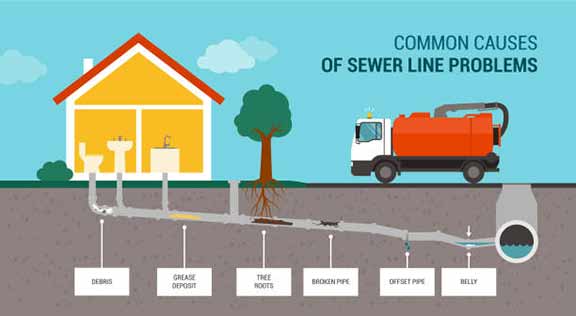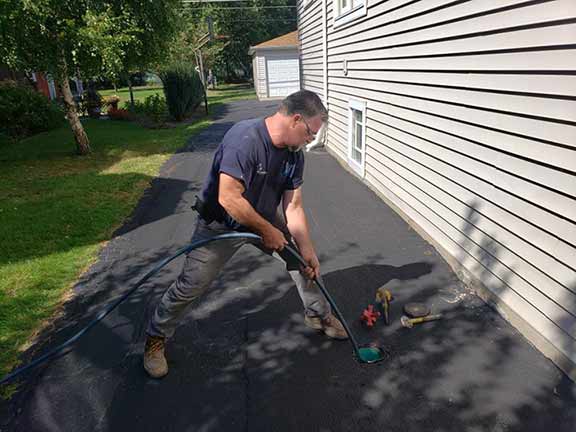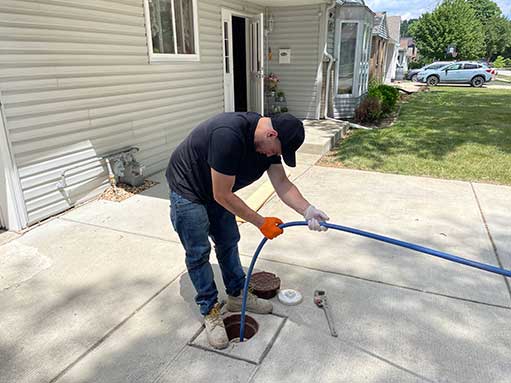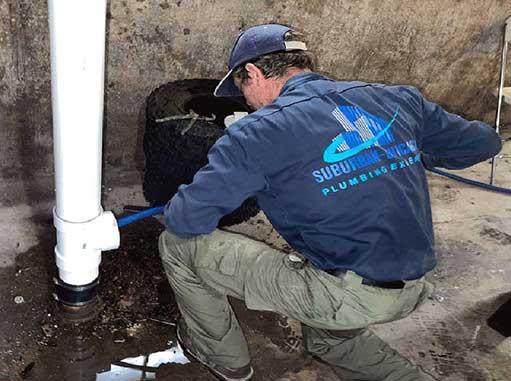
Understanding the Importance of Sewer Line Cleaning
Sewer line cleaning is a critical aspect of home maintenance that often goes overlooked. For homeowners, understanding the importance of regular sewer line cleaning can prevent costly repairs and ensure the efficient functioning of household plumbing systems. A clean sewer line is essential for the smooth operation of water flow and waste disposal in your home. Neglecting this vital task can lead to severe blockages, resulting in water backup, unpleasant odors, and potential damage to your home’s foundation. Regular maintenance not only enhances the longevity of your plumbing system but also contributes to the overall health and safety of your living environment.
The importance of sewer line cleaning extends beyond immediate household concerns. Unmaintained sewer lines can lead to environmental issues, such as soil contamination and water pollution. By ensuring that your sewer lines are clean, you are playing a crucial role in protecting local ecosystems and preventing harmful substances from entering waterways. Thus, sewer line cleaning is not merely a domestic responsibility but a community obligation that promotes ecological balance.
Common Causes of Sewer Line Blockages
Blockages in sewer lines can arise from various sources, each requiring specific attention and solutions. One of the most common causes is tree roots infiltrating the pipes. Trees naturally seek out moisture, and sewer lines provide a perfect source. As roots grow and expand, they can penetrate pipes, causing significant blockages and potential damage. Grease buildup is another frequent culprit. Over time, fats, oils, and grease from kitchen waste can solidify within the pipes, obstructing the flow and leading to blockages.
Foreign objects, such as sanitary products, wipes, and even children’s toys, can accidentally find their way into the sewer system, causing obstructions. These items are not designed to break down easily and can create stubborn blockages. Additionally, old or deteriorating pipes may collapse or become misshapen, further contributing to blockage issues. Understanding these common causes allows homeowners to take proactive measures, such as installing root barriers or practicing mindful disposal habits, to prevent sewer line blockages.
Signs You Need Sewer Line Cleaning
Recognizing the signs that your sewer line requires cleaning is crucial for timely intervention. One of the most apparent indicators is slow drainage in sinks, toilets, and bathtubs. If water is taking longer than usual to drain, it may suggest a blockage in the sewer line. Foul odors emanating from drains are another telltale sign. These smells often result from waste buildup within the pipes, indicating the need for thorough cleaning.
Unusual sounds, such as gurgling or bubbling, in plumbing fixtures can also signal a problem. These noises often occur when air is trapped due to blockages, disrupting the normal flow of water. Additionally, frequent backups or overflows, particularly in lower-level fixtures, can suggest a major obstruction in the main sewer line. By being vigilant and responsive to these signs, homeowners can prevent minor issues from escalating into costly repairs.
DIY Sewer Line Cleaning Techniques
While professional services are recommended for comprehensive sewer line cleaning, there are several DIY techniques homeowners can employ for minor blockages. One popular method is the use of chemical cleaners designed to dissolve grease and organic matter. These products can be effective for minor clogs but should be used cautiously to avoid damaging pipes. Plumbing snakes, or augers, are another tool that can help dislodge blockages. These flexible devices can reach deep into pipes to clear obstructions.
Homeowners can also try using a mixture of baking soda and vinegar, a natural solution that can break down buildup and freshen drains. Flushing pipes with hot water can help dissolve grease and improve flow. However, it’s important to recognize the limitations of DIY techniques. For persistent or severe blockages, professional intervention is often necessary to ensure a thorough and lasting solution. DIY methods can be a useful first step, but relying solely on them may not address underlying issues.
Professional Sewer Line Cleaning Services
For severe blockages or routine maintenance, professional sewer line cleaning services offer expertise and advanced equipment to ensure thorough cleaning. Professionals use high-pressure water jetting to clear stubborn blockages and clean pipes effectively. This method is highly efficient and can remove even the most challenging obstructions. Sewer camera inspections are another tool used by professionals to diagnose the condition of sewer lines and identify specific problem areas.
Hiring professionals provides peace of mind, knowing that the cleaning process is conducted safely and thoroughly. They possess the knowledge and experience to handle complex situations, minimizing the risk of damage to your plumbing system. Additionally, professional sewer line cleaning services often include warranties or guarantees, offering homeowners added protection and assurance. By investing in professional sewer line cleaning, homeowners can maintain optimal plumbing performance and prevent future issues.

Preventive Measures for Sewer Line Maintenance
Preventive maintenance is key to avoiding frequent sewer line blockages and ensuring the longevity of your plumbing system. Regular inspections by professionals can help identify potential issues before they become serious problems. Homeowners should also adopt mindful disposal practices, avoiding flushing non-biodegradable items and disposing of grease and oils properly.
The use of enzyme cleaners can aid in breaking down organic matter within pipes, maintaining a clear flow. Additionally, installing drain screens can prevent debris from entering the sewer system. Landscaping considerations, such as planting trees away from sewer lines, can reduce the risk of root infiltration. By implementing these preventive measures, homeowners can significantly reduce the likelihood of blockages and ensure the efficient operation of their plumbing systems.
Cost Implications of Sewer Line Cleaning
Understanding the cost implications of sewer line cleaning can help homeowners budget accordingly and make informed decisions about maintenance services. The severity of blockages is a major factor influencing cost. Minor obstructions may be resolved with affordable DIY methods, while severe blockages may require professional intervention, which can be more costly.
The method of cleaning also affects the cost. High-pressure hydro jetting and camera inspections of your sewer line typically incur higher expenses due to the advanced equipment and expertise involved. Homeowners must weigh the benefits of professional services against the cost, considering the long-term advantages of thorough cleaning. Additionally, geographical location and the choice of service provider can impact pricing. By understanding these factors, homeowners can plan for sewer line maintenance expenses and prioritize necessary services.
Environmental Impact of Sewer Line Blockages
Beyond the immediate inconvenience to homeowners, sewer line blockages can have significant environmental repercussions. Blockages can lead to sewage overflow, contaminating soil and water sources. This pollution poses risks to local wildlife and ecosystems, disrupting natural habitats and causing harm to aquatic life.
Regular sewer line cleaning can prevent these environmental issues by ensuring that waste is properly managed and contained within the sewer system. By maintaining clean sewer lines, homeowners contribute to the protection of local environments and the preservation of natural resources. This responsibility highlights the importance of proactive maintenance and the broader impact of individual actions on community and ecological health.
Future Trends in Sewer Line Cleaning Technology
The field of sewer line cleaning is continually evolving, with advancements in technology offering more efficient and environmentally friendly solutions. Trenchless repair techniques, such as pipe relining, allow for minimal disruption to landscapes while effectively addressing pipe damage. These methods reduce the need for extensive excavation, preserving the surrounding environment.
Eco-friendly cleaning agents are being developed to minimize the impact of chemical cleaners on the environment. These products provide effective cleaning without harmful residues. Additionally, smart technology is being integrated into sewer line maintenance, enabling real-time monitoring and early detection of issues. These innovations promise enhanced efficiency and sustainability in sewer line cleaning, benefiting homeowners and the environment alike.
Conclusion: The Role of Homeowners in Sewer Line Maintenance
In conclusion, sewer line cleaning is a vital responsibility for homeowners that requires attention and proactive measures. By understanding the importance, methods, and future trends in sewer line cleaning, homeowners can ensure the efficient functioning of their plumbing systems and contribute positively to environmental conservation. Regular maintenance prevents costly repairs and protects local ecosystems, emphasizing the broader impact of individual actions.
Homeowners are encouraged to stay informed about best practices in sewer line maintenance and to seek professional assistance when necessary. By prioritizing sewer line cleaning, homeowners play a crucial role in maintaining the health and safety of their homes and communities. Ongoing education and vigilance in home maintenance practices are essential for sustaining clean and efficient sewer systems.

